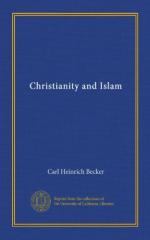Union with God is gained by ecstasy and leads to enthusiasm. These terms will therefore show us in what quarter we must seek the strongest impulses to mysticism. The concepts, if not the actual terms, are to be found in Islam: they were undoubtedly transmitted by Christianity and undergo the wide extension which results in the dervish and fakir developments. Dervish and fakir are the Persian and Arabic words for “beggar”: the word sufi, a man in a woollen shirt, is also used in the same sense. The terms show that asceticism is a fundamental element in mysticism; asceticism was itself an importation to Islam. Dervishes are divided into different classes or orders, according to the methods by which they severally prefer to attain ecstasy: dancing and recitation are practised by the dancing and howling dervishes and other methods are in vogue. It is an institution very different from monasticism but the result of a course of development undoubtedly similar to that which produced the monk: dervishism and monasticism are independent developments of the same original idea.
Among these Muhammedan companies attempts to reach the point of ecstasy have developed to a rigid discipline of the soul; the believer must subject himself to his master, resigning all power of will, and so gradually reaches higher stages of knowledge until he is eventually led to the consciousness of his absolute identity with God. It seems to me beyond question that this method is reflected in the exercitiis spiritualibus of Ignatius Loyola, the chief instrument by which the Jesuits secured dominion over souls. Any one who has realised the enormous influence which Arab thought exerted upon Spanish Christianity so late as the fourteenth and fifteenth centuries, will not regard the conjecture as unfounded.




